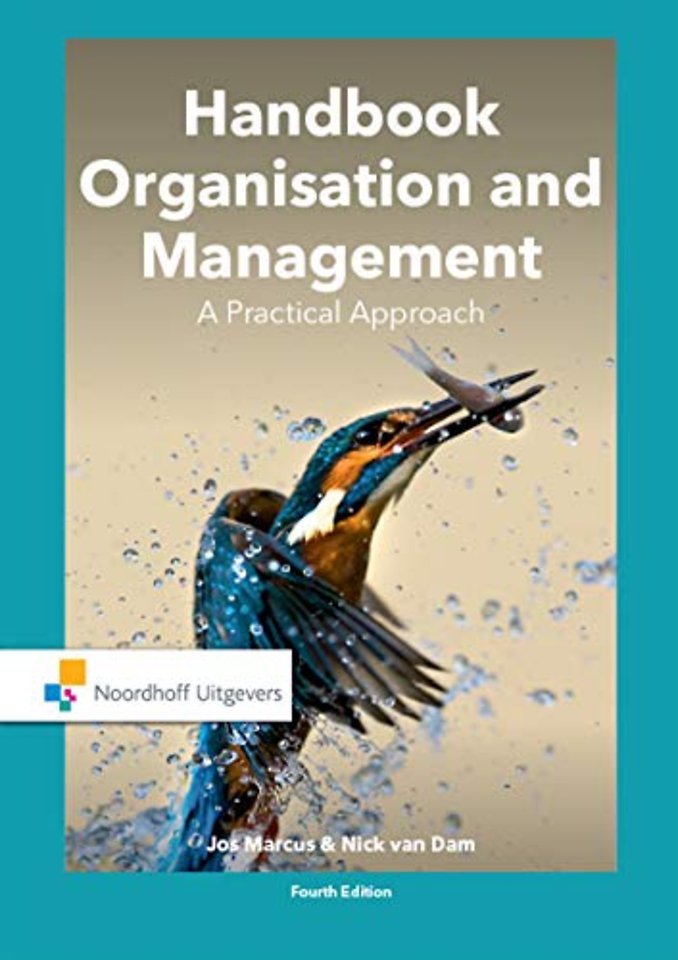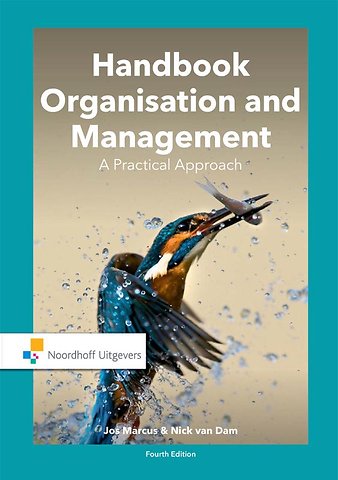


Jos Marcus studeerde economische wetenschappen aan de Vrije Leergangen – Vrije
Universiteit (Bachelor degree) en bedrijfseconomie aan de Vrije Universiteit (Master degree) en is momenteel werkzaam bij de Hogeschool INHOLLAND, Diemen/
Amsterdam.
Handbook Organisation and Management
A Practical Approach
Paperback Engels 2019 4e druk 9789001895648Samenvatting
'Handbook Organisation and Management – A Practical Approach' is an interactive and hands-on introduction to the field. The theory behind management and organisation is accessibly explained by renowned authors Jos Marcus and Nick van Dam using many practical examples.
The book comprises three sections:
– Environments and Organisations
– People and Organisations
– Structure and Organisations
This fully renewed edition has been expanded with six new chapters on digital business transformation, internationalisation, corporate social responsibility, the future of work, human resource management, and culture. In addition, the book contains new, topical practical examples, and features a fully modernised layout.
Handbook Organisation and Management is suitable for all Higher Professional Business Education-studies whose curriculum wants to create a strong foundation in the field of Organisation & Management.
Digital support
The companion website offers students multiple choice questions, practical cases, and assignments. In addition, students have online access to the concept training program. Teachers can assess test exams, cases, and college sheets. This book lets teachers compile their own exams using www.toetsopmaat.nl; a database that contains the questions from all student test exams. There are also additional, secure test questions. Exams can be exported in various formats.
Trefwoorden
Specificaties
Lezersrecensies
Over Nick van Dam
Inhoudsopgave
About the authors 8
Introduction 20
The evolution of organisation
and management 23
Start-up 24
1 Introduction 24
2 Origins of the field of study 26
3 Development of trade and emergence of multinational enterprises 28
4 Schools of thought and personalities 29
5 Events prior to the Industrial Revolution (400 BC–1900 AD) 30
6 Frederick Taylor and scientific management (C. 1900) 31
7 Henri Fayol and general management-theory (C. 1900) 34
8 Max Weber and bureaucracy theory (C. 1920) 35
9 Elton Mayo and the human relations movement (C. 1945) 36
10 Rensis Likert (and others) and the neo-human relations approach (C. 1950) 37
11 Kenneth Boulding and the systems approach (C. 1950) 39
12 Paul Lawrence and Jay Lorsch and the contingency approach (C. 1965) 40
13 Recent organisational theories (1980+) 40
Summary 57
PART A Organisations and their environment 59
Interview with Raymond Cloosterman, founder of Rituals 60
1 Environmental influences 65
Start-up 66
1.1 Introduction 66
1.2 Stakeholders 67
1.3 External factors 71
1.3.1 Environmental factors 71
1.3.2 Technological factors 75
1.3.3 Demographic factors 78
1.3.4 Economic factors 81
1.3.5 Political factors 85
1.3.6 Societal factors 89
Summary 95
Table of contents
2 STRATEGIC MANAGEMENT 97
Start-up 98
2.1 Introduction 99
2.2 The classical approach to strategic management 99
2.2.1 Situational analysis 100
2.2.2 Strategy formation 117
2.2.3 Planning and implementation 130
2.3 Critical comments on the classic approach to strategic management 132
2.4 Strategic management in the 21st century 134
2.4.1 Strategy model of Hamel and Prahalad 135
2.4.2 Strategy formation in times of disruption and innovation 138
2.4.3 Starts-ups and the ‘lean’ strategy process 142
2.5 Strategic management and business intelligence 144
2.6 Types of collaboration 146
2.6.1 Collaborative organisational forms 146
2.6.2 Alliances: motivating factors and the keys to success 152
2.7 Collaboration between competitors and partners 156
2.7.1 Collaboration between competitors 156
2.7.2 Collaboration between non-competitive organisations 157
2.8 Mergers and acquisitions 158
2.8.1 The motives behind mergers and acquisitions 160
2.8.2 Dutch Consumer and Market Authority 161
2.8.3 Problems associated with mergers and acquisitions 163
2.8.4 After the merger 164
Summary 167
3 Digital transformation 171
Start-up 172
3.1 Introduction 172
3.2 Phases of digital transformation 174
3.3 Key technologies for digital transformation 176
3.3.1 Mobile Internet 177
3.3.2 Cloud Technology/Cloud Computing 177
3.3.3 Internet of Things 179
3.3.4 Artificial Intelligence (AI) 179
3.3.5 Advanced Robotics/Robotisation 180
3.3.6 3D printing 181
3.3.7 Virtual and Augmented Reality 182
3.3.8 Big Data 182
3.4 The impact of digital transformation 183
3.4.1 The financial sector 184
3.4.2 The retail industry 185
3.4.3 The healthcare industry 185
3.4.4 The automobile industry 187
3.4.5 The agriculture and nutrition industry 188
3.4.6 The manufacture industry 189
3.4.7 Transport and logistics 189
3.5 Conditions for successful digital transformation 190
Summary 193
4 Internationalisation 195
Start-up 196
4.1 Introduction 197
4.2 Forms of economic integration 200
4.3 International organisations 204
4.4 International management 209
4.4.1 Stage model theory of internationalisation (Uppsala model) 210
4.4.2 Born Globals 212
4.4.3 Basic forms of international organising 213
4.4.4 Outsourcing 214
Summary 219
5 Corporate social responsibility, corporate governance, and ethics 221
Start-up 222
5.1 Introduction to corporate social responsibility 222
5.1.1 Two perspectives on Social Responsibility 222
5.1.2 Social enterprise 223
5.1.3 Sustainable development 225
5.1.4 Corporate Social Responsibility (CSR) 230
5.1.5 Basics and perspectives of CSR 232
5.1.6 Stances on Corporate Social Responsibility 234
5.1.7 Dutch CSR organisations 236
5.1.8 International CSR 238
5.2 Introduction to corporate governance 241
5.2.1 Development of Corporate Governance Code in the Netherlands 244
5.2.2 Corporate governance abroad 245
5.3 Introduction to business ethics 246
5.3.1 Sources of ethical conduct 248
5.3.2 Responsibility, accountability and integrity 248
5.3.3 Approaches to ethics 250
5.3.4 Company code 251
Summary 254
Anderen die dit boek kochten, kochten ook
Rubrieken
- advisering
- algemeen management
- coaching en trainen
- communicatie en media
- economie
- financieel management
- inkoop en logistiek
- internet en social media
- it-management / ict
- juridisch
- leiderschap
- marketing
- mens en maatschappij
- non-profit
- ondernemen
- organisatiekunde
- personal finance
- personeelsmanagement
- persoonlijke effectiviteit
- projectmanagement
- psychologie
- reclame en verkoop
- strategisch management
- verandermanagement
- werk en loopbaan





